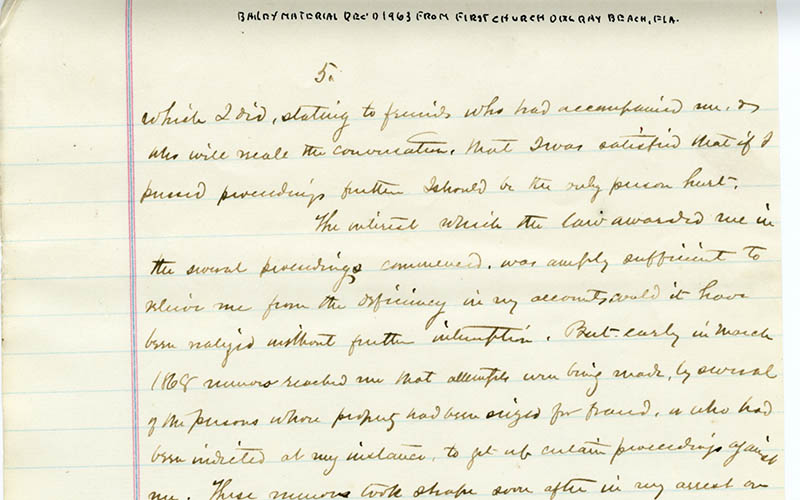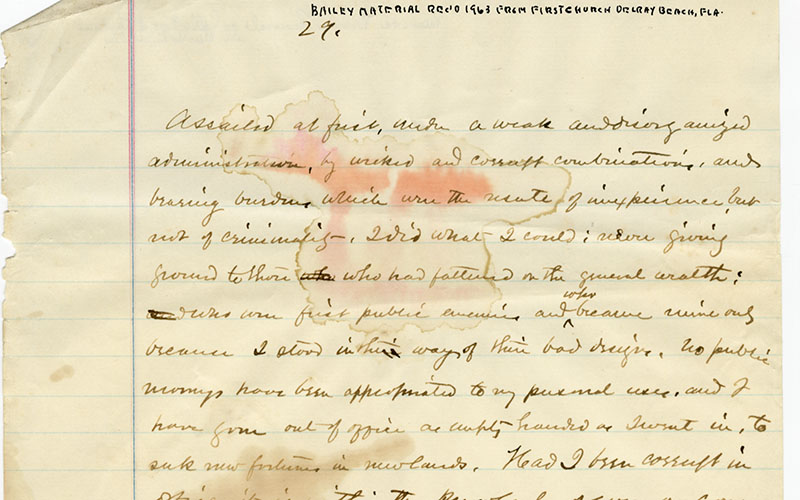Joshua Bailey, United States Internal Revenue Collector
Joshua F. Bailey’s handwritten recollections (page 5), 1889. 717a.87.004. Click to see full page
Mary Baker Eddy asked her student Joshua F. Bailey (1831–1907) to take extensive notes in two of her 1889 classes on Christian Science. While it is unclear why she made the request, a small selection of the notes was published in her book Miscellaneous Writings 1883-1896.1 Additional excerpts appeared in the March 2004 issue of The Christian Science Journal.2 Bailey’s manuscript is in the archives of The Mary Baker Eddy Library.
Bailey was Editor of the Journal from February 1889 to November 1890. Before he found Christian Science and became a practitioner and teacher, his varied career included representing Thomas A. Edison in Europe, where he promoted expanded use of the electric light.3
Bailey also went through some dark times. “…what a life of anxiety and vicissitude I had led,” he recalled in writing about his path to Christian Science. “At this time I broke down in mind and body. It was then that Christian Science found me ….”4 One such “vicissitude” came after he was appointed Collector for the 4th collection district of the State of New York for the Internal Revenue Service, in 1865—work that would ultimately result in his fleeing the United States.
The federal government had started taxing alcohol, to help fund the Civil War. By 1865 the tax rate had risen dramatically and became an inducement for fraud. By not declaring all the alcohol they produced, distillers could lower their tax bills considerably. During Ulysses S. Grant’s presidency, corrupt members of the Republican party, known as the “Whiskey Ring,” conspired with distillery owners and taxation officials to swell the party’s coffers.5
Bailey was responsible for collecting taxes from New York’s distilleries and impounding any undeclared liquor. He took up his duties with “zeal and with the determination to make their faithful discharge the means of securing further advancement and more general public approval.”6 But this public-spirited attitude brought him into conflict with the Whiskey Ring.
Distillery owner Dr. Alvah Blaisdell, in league with Major Alfred A. Belknap, a United States Treasury agent, resolved to halt Bailey’s efforts. Blaisdell paid four men to make sworn statements, under assumed names, that Bailey had been accepting illegal payments. In order for Belknap to arrest Bailey, however, the statements had to be sworn in front of a magistrate. Three of the four witnesses got cold feet because they were known as criminals to the magistrate; only one made a statement. But this was enough for Belknap to arrest Bailey, and he stood trial in July 1868.7
Joshua F. Bailey’s handwritten recollections (page 29), 1889. 717a.87.004. Click to see full page
Bailey had gotten wind of the Whiskey Ring’s plot. At his request, Secret Service agent Frederick C. Tapley uncovered ample proof that Blaisdell had bribed the witnesses, and that Belknap had been deeply involved. Years later Bailey would introduce Agent Tapley to Christian Science, saying this to him of Eddy’s book Science and Health with Key to the Scriptures: “Live in that Book. Every moment of this thought in Science, guided by that book, is a moment of healing.”8
The case against Bailey quickly fell apart, and all charges were dismissed.9
But Bailey was soon caught up in a related case that almost ruined him. His 1869 appointment as tax collector for the 32nd district of New York City uncovered questionable accounting practices during his earlier service, involving a $100,000 deficit in Bailey’s accounts, for which he and his sureties were liable. In order to make up the discrepancy, Bailey had recorded collected taxes as uncollected, and had deposited the collected money.10 On paper Bailey had made up the difference, but in reality there was a $100,000 deficit that he never properly explained. Having been tipped off that his accounts were under scrutiny, Bailey fled the United States for South America and spent several years, with little money, in Buenos Aires and Rio de Janeiro. And his “vicissitudes” continued—in his absence a grand jury indicted him on charges of “defalcation” (a misappropriation or theft of assets). He also lost his wife to an accident at sea.
Bailey received a pardon from President Grant in 1876 and returned home with the “unmistakable traces of long suffering.”11 His hardships finally began to abate when he found Christian Science, sometime about 1888. “I confidently believe,” he later reflected, “that the general public too whose servant I have been will hold that whatever have been my errors, outside of those, I have not been undeserving of praise, and that my public service greatly outweighs in the balance.”12
We do not know whether Eddy was aware of Bailey’s past experiences. But as he made notes in her 1889 classes, these words may have been especially resonant:
One God, one Mind, and love your neighbor as yourself. In this truth we are in the divine harmony. The loving of our neighbor as ourself is just as imperative as one God. Thou shalt love thy neighbor &c. Then we have only one interest, no divided interest. It is no longer “My interest,” mine & thine, but it is ours. There is no healing physically without healing morally.13
- Mary Baker Eddy, Miscellaneous Writings 1883–1896 (Boston: The Christian Science Board of Directors), 279–282.
- “Notes from class with Mary Baker Eddy,” The Christian Science Journal, March 2004, 23.
- Robert Peel, Mary Baker Eddy: The Years of Trial (Boston: The Christian Science Publishing Society, 1971), 264.
- Joshua F. Bailey to F. C. Tapley, 12 October 1892, Subject File, Bailey, Joshua F. (1831–1907) – Correspondence to Mr. and Mrs. F. C. Tapley, 1892–1893.
- For more information on this national scandal, see Timothy Rives, “Grant, Babcock, and the Whiskey Ring,.” Prologue, Fall 2000, Vol. 32, No. 3. https://www.archives.gov/publications/prologue/2000/fall/whiskey-ring-1
- Bailey, handwritten memoir, 1, Subject File, Bailey, Joshua F. (1831–1907) – Papers: Memoirs, Collector of Internal Revenue.
- Conspiracy of the Whiskey Ring Against Collector J. F. Bailey (New York: Wm. C. Bryant & Co., 1869), 3–5.
- Bailey to Tapley, 24 January 1893, Subject File, Bailey, Joshua F. (1831-1907) – Correspondence to Mr. and Mrs. F. C. Tapley, 1892-1893.
- Bailey, handwritten memoir, 5.
- “Bailey’s Flight: The Hounds of the Law Unleashed,” The New York Times, 23 March 1870.
- “A Fugitive’s Return,” New York Herald, 13 December 1876.
- Bailey, handwritten memoir, 29.
- “Notes from Class with Mary Baker Eddy,” Journal, March 2004, 23.



